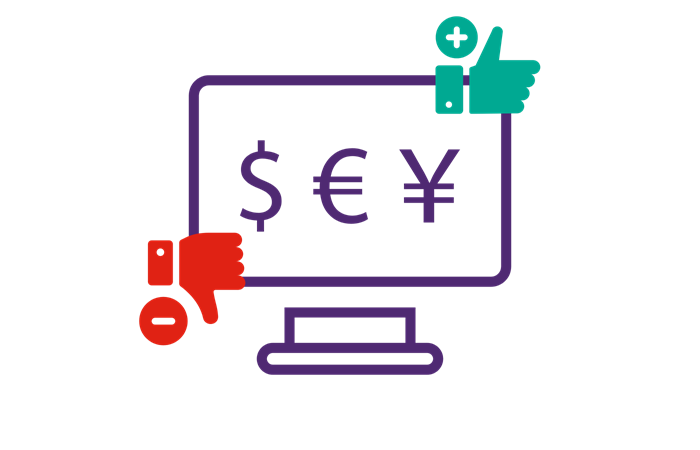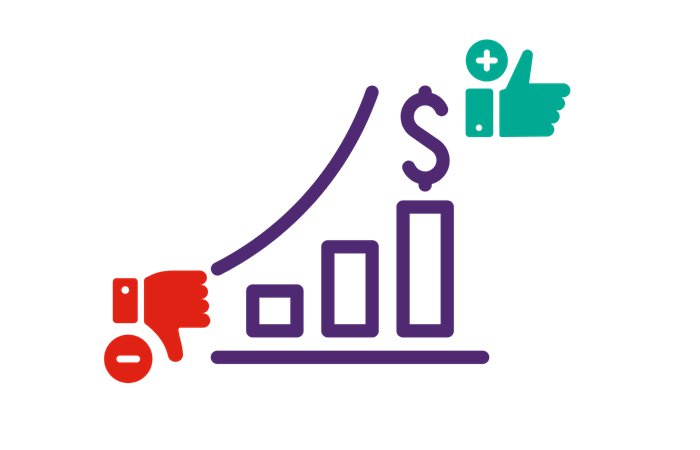Forex vs stock trading - what should traders know?
In order to compare Forex and stock trading, we need to look at both the fundamental and technical aspects of these two markets. In fact, there’s a very easy way to describe it in one sentence.
“Forex and stocks technically similar, but fundamentally different”
What this means is that the way people trade these assets, or the way they
make strategies is usually very similar, but the assets themselves are very different. This is especially the case when it comes to talking about centralization.

Centralization is a measure which can tell us how much of one thing is located in one place. When it comes to Forex, we can easily say that it’s not very centralized. Every country has a national bank that has a lot of reserves of its currency as well as foreign currency. Because of this, the Forex market is much more diverse.
Usually, the Forex vs stock market centralization discussion ends there, but we need to explain stock market centralization as well.
Stocks are the shares of companies. These companies have a specific country where they are registered. Because of this, they can only register on local stock exchanges officially, but also have their stocks sold abroad.
Therefore, we get a very big difference. Stock exchanges in the United States are bigger than stock exchanges in…let’s say India. The same can be said about stock exchanges in China, the United Kingdom, etc.
Every stock exchange can be ranked based on how many large companies stocks it sells. This makes it a lot more centralized, simply because the current largest companies in the world are located in the USA.
Centralization is one of the reasons why Forex is better than stocks, but most traders usually don’t pay too much attention to this detail and don’t consider it a big advantage.
Next, let’s try and list some advantages and disadvantages of both of these markets.
Advantages & Disadvantages of Forex

Advantages:
- Not too centralized
- Trader familiarity
- Better liquidity
- Easier to access for beginners
- A chance for larger payouts
Disadvantages:
- Hard to understand
- Too many things to consider
- Very responsive to politics
- Limited options
These are the basic advantages and disadvantages beginners as well as experts usually consider when comparing Forex to stocks, but it’s definitely not a complete list. Additional points can be added, but they mostly appear when already on a higher level of trading knowledge, so these should do.
Now let’s try and explain all of these points.
Not too centralized - this means that there are a lot more people taking part in the market. For example, if you place an order to buy USD with EUR, you’re not necessarily restricted to buying only from the people near you. The order can be filled by somebody halfway across the world from you. This keeps the market very fast and efficient.
Trader familiarity - this means that most traders are already familiar with their currency of choice, and more or less know what affects its exchange rate. Because of this, they usually create a better strategy and respond faster whenever there’s a shift in the market.
Better liquidity - liquidity means how fast something can be sold. For example, imagine that you’re trying to sell a phone and a house. In this case, the phone would have more liquidity, simply because there are more people who are ready to buy it.
Why? Because there are not as many people out there who can afford a house, compared to those who can afford a phone. The more buyers there are, the more liquidity an asset has.
In this case, when we talk about Forex or stocks, we need to consider how many people prefer to “buy cash”, and how many want to buy shares. Because of this, Forex usually has more liquidity and is easier to process orders.
Easier to access - what this means is that it’s easier to start as a beginner. You see, when people start trading, they usually find providers (brokers). These providers usually ask for a deposit so that they can open an account for the trader. Forex brokers tend to ask for much less as a minimum deposit compared to stockbrokers, which is why starting Forex trading is usually easier.
A chance for larger payouts - this means that with Forex, traders usually have the opportunity to generate more with less. This is due to a tool called leverage. Although stock trading also has leverage, Forex usually has more of it.
Basically how it works is that a trader places a trade, and the provider (broker) multiplies it. So, if the leverage is 1:10, this means that the size of your trade will be increased by 10 times by the provider.
This gives traders the opportunity to generate more payouts with smaller deposits and is a very important difference between Forex and stock trading.
Advantages & disadvantages of stocks
Advantages:
- Variety
- Familiarity
- Volatility
- Long-term investments
Disadvantages:
- High entry barrier
- Riskier
- Time-consuming
These are the basic advantages and disadvantages of the stock market, but much like Forex, they need to be explained in detail as well.
Variety - what this means is that there are a lot more options with stocks than there are with currencies. With
currency pairs, we get the option of those that exist, right? Well, how many countries are there that have their own currency? 180 to be exact. What this means is that you can diversify the currencies you pair up together, but can’t really expect new ones to come out.
With stocks, there’s a different story. There are thousands of companies that are registered on exchanges and can be traded. There are thousands more that will soon be registered on exchanges as well. This is why the Forex vs stocks argument is simply not debatable when it comes to variety.
Familiarity - similar to Forex, stocks are also very familiar with traders. Imagine a company whose products or services you use on a daily basis. You probably already know how they make their income and how they manage to remain in business. This gives you as a trader the advantage of relative knowledge.
Because of this, you are more likely to understand what some even can change in the company. This usually helps traders to make the correct trading choices in the long run.
Volatility - volatility is something to measure how often the price of an asset changes. For example, if it changes every single day by a significant amount (10-100+%) it’s considered highly volatile. But if it tends to remain on the same price or increase/decrease at a very slow pace, it’s considered low volatility.
Stocks have much higher volatility than currencies, which is why traders usually get better payouts from trading them.
Long-time investments - stocks are usually bought as long-term investments. What this means is that traders buy stocks of companies and hold onto them for months, years or even decades.
Although stocks can change their price much more often, holding onto them for a long time usually results in a better payout. But there have been exceptions such as during the 2008 market crash when all of the stocks decreased in value very rapidly.